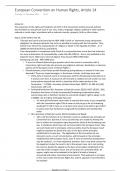European Convention on Human Rights, Article 14
Thursday, 11 November 2021 15:01
Article 14
The enjoyment of the rights and freedoms set forth in this Convention shall be secured without
discrimination on any ground such as sex, race, colour, language, religion, political or other opinion,
national or social origin, association with a national minority, property, birth or other status.
Status of the ECHR in the UK
- Tribunals and courts are bound by the HRA 1998 s3 with an 'extremely strong interpretive
obligation' to interpret domestic law so far as possible to comply with the Convention. Thus,
Article 9 can inform the interpretation of 'religion or belief' in the Equality Act 2010. - X v Y
[2004] ICR 1634 (CA) [57] (1) and [59] (4)
- If an interpretation in compliance with Article 9 is not possible then courts (but not tribunals)
can issue a declaration of incompatibility, under the HRA 1998 s4 - this is only available to the
Supreme Court, High Court, Court of Appeal, Privy Council (HRA 1998 s4(5))
- Strasbourg case law - HRA 1998 s2(1):
○ 'A court or tribunal determining a question which has arisen in connection with a
Convention right must take into account any judgment, decision, declaration or advisory
opinion of the European Court of Human Rights…'
○ Should domestic courts keep up with Strasbourg jurisprudence, or extend it if the case
demands? There are mixed messages. In the House of Lords, Lord Hope once said:
▪ '[T]he duty of national courts is to keep pace with the Strasbourg jurisprudence as
it evolves over time. A measure of self-restraint is needed, lest we stretch our own
jurisprudence beyond that which is shared by all the states parties to the
Convention.' - R (Clift) v Secretary of State Home Dept. [2007] 1 AC 484 (HL) [49].
Overturned, Clift v UK
▪ Followed/reinforced AB v Secretary of State for Justice [2021] UKSC 28 [54] - [60].
Elsewhere the House of Lords has extended Strasbourg jurisprudence when
overturning a ban in Northern Ireland on unmarried couples' right to adopt. In Re
G [2009] 1 AC 173 (HL), [119] Lady Hale said:
□ 'So what did Parliament mean when it required the courts to act compatibly
with the Convention rights? Did it mean us only to go so far as Strasbourg
would go? Or did it mean us, in at least some cases, to be able to go further?
It seems clear that Parliament recognised the problem and intended the
latter'
▪ AB v Secretary of State for Justice [2021] (notably Lord Reed):
□ '[I]t is not the function of our domestic courts to establish new principles of
Convention law. But that is not to say that they are unable to develop the
law in relation to Convention rights beyond the limits of the Strasbourg case
law. In situations which have not yet come before the European Court, they
can and should aim to anticipate, where possible, how the European Court
might be expected to decide the case, on the basis of the principles
established in its case law… The application of the Convention by our
domestic courts, in such circumstances, will be based on the principles
established by the European Court, even if some incremental development
may be involved… As I have explained, however, that is not what counsel for
the appellant invites the court to do in the present case. He Is not inviting
the court to decide the appeal on the basis of principles established in the
case law of the European Court, but on the basis of a principle which, he
argues, ought now to be adopted in the light of a body of material
concerned with other international instruments. That approach is not open
to this court under the Human Rights Act, and his argument must therefore
be rejected.'
□ This judgment referred to 42 cases but not Re G
Equality Law Page 1




